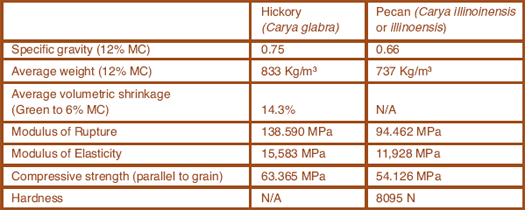Hickory and Pecan


Botanical name: Carya spp.
Common/commercial names: None
Distribution & Availability
Eastern USA, principal commercial areas are the Central and Southern states. Readily available, but more limited if sold selected for colour as either red or white hickory or pecan. For export, lumber may be limited in the higher grades and available mainly in thinner stock.
General Description
The hickories are an important group within the eastern hardwood forests. Botanically, they are split into two groups; the true hickories, and the pecan hickories (fruit bearing). The wood is virtually the same for both and is usually sold together. The sapwood of hickory and pecan is white, tinged with brown while the heartwood is pale to reddish brown. Both are coarse textured and the grain is usually straight but can be wavy or irregular.
Physical & Mechanical Properties

The density and strength of the hickories will vary according to the rate of growth, with the true hickories generally showing higher values than the pecan hickories. The wood is well known for its very good strength and shock resistance and it also has excellent steam bending properties.
Working Properties
The hickories are considered difficult to machine and glue, and are very hard to work with hand tools, so care is needed. They hold nails and screws well, but there is a tendency to split so pre-boring is advised. The wood can be sanded and polished to a good finish. It can be difficult to dry and has a large shrinkage, which may affect stability under variable moisture conditions.
Durability
Rated as non-resistant to heartwood decay. The wood is classed as resistant to preservative treatment.
Other information
Typically referred to as hickory in the North and pecan in the South of the USA. Bird pecks are a common characteristic and are not considered as defects. Deep purple mineral streaks are also a natural characteristic and are not considered as defects. The FAS lumber grade permits a minimum width of 4 inches (101.6mm).
Main Uses
Tool handles, furniture, cabinetry, flooring, wooden ladders, dowels and sporting goods. Hickory is increasingly being exported for flooring, for its attractive rustic look and hardwearing properties.
